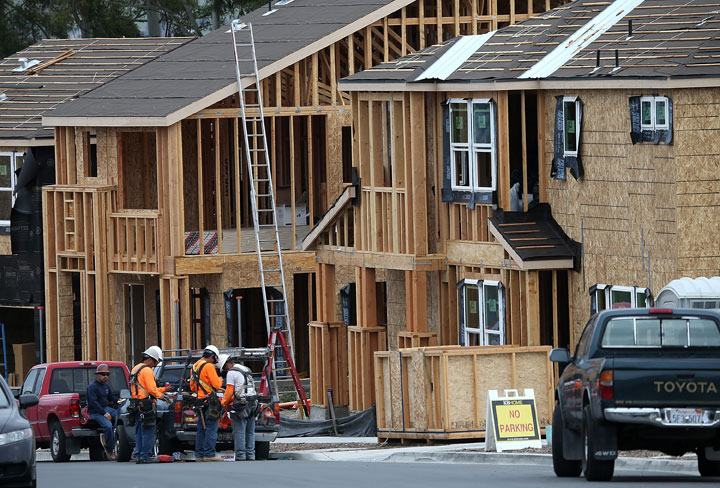OTTAWA – Home construction in Canada staged a surprising spring resurgence in May, particularly in the seemingly overbuilt condominium market, defying expectations of a slowdown and even deep correction.

The latest housing starts data from Canada Mortgage and Housing Corp. showed building rose to an annualized 200,178 units last month — with condos leading the way — about 20,000 over economists’ expectations and almost 25,000 above the April number.
The total is also above the 170,000 units analysts consider the fundamental growth in housing formation in Canada, or the rate by which demand for new homes are in line with demographic factors.
But it appears to support last week’s better-than-expected employment report that estimated 43,000 new jobs had been created in the construction industry last month.
“It’s defying gravity,” said Benjamin Tal, deputy chief economist with CIBC World Markets. “We have no business being at 200,000 at this point … but the indications I’m getting is that we are slowing down and I do believe if you look at the next six to eight months, it will not be as strong.”
Other analysts also called the expansion, particularly in the condominium market, unsustainable.
“May’s sharp jump in the pace of new home construction is unlikely to be sustained,” TD Bank economist Dina Ignjatovic said.
“Indeed, slower price growth in the housing market could lead to lower homebuilding activity in the coming quarters. Moreover, the overbuilding that has taken place over the last ten years could lead to new home construction falling below this demographic need for a period of time.”
That is also the view of CMHC analyst Mathieu Laberge, who noted the six-month moving average, or the trend in starts, remained largely unchanged in May at a more sustainable 182,756 annualized.
Still, predictions of a pop in the Canadian housing bubble have yet to appear.
The market did noticeably fall from dizzying heights following last July’s changes to regulations that made mortgages more difficult and more costly to obtain for first-time buyers. The cooling was most noticeable in starts and in sales, which are off about 10 per cent from last year. But prices have remained stubbornly immune.
Last week, the Paris-based OECD cited Canada as one of the most concerning markets in the world, one of three in which despite their elevated levels, prices are still rising.
But Tal, and many others, believe with sales falling, prices will also eventually move lower.
Barring that, he says the superintendent of financial institutions may have no choice but to follow through on its hint that it might lessen the amortization period from 30 to 25 years for uninsured mortgages — those with more than 20 per cent downpayment — bringing those in line with CMHC-insured borrowing.
The Bank of Canada and the federal government have long worried about Canada’s housing market continuing to expand beyond fundamental levels because of the potential for a sudden and steep crash once interest rates start to rise, which would not only put many homeowners’ finances in jeopardy, but could also sideswipe the economy.
One encouraging element in the May numbers — for those who subscribe to the soft landing scenario — is that most of the gains came in the notoriously volatile condo market, which registered a 22.2 per cent jump in starts to 114,346 units annualized. Single urban starts rose only three per cent to 62,888 units.
In actual starts, there were an estimated 18,301 actual starts last month which would equate to a seasonally adjusted annual rate of 200,178 starts.
Urban starts increased 14.6 per cent in May to 177,234 units, led by gains in Atlantic Canada and Ontario, while the Prairies saw little change and British Columbia and Quebec decreased.



Comments